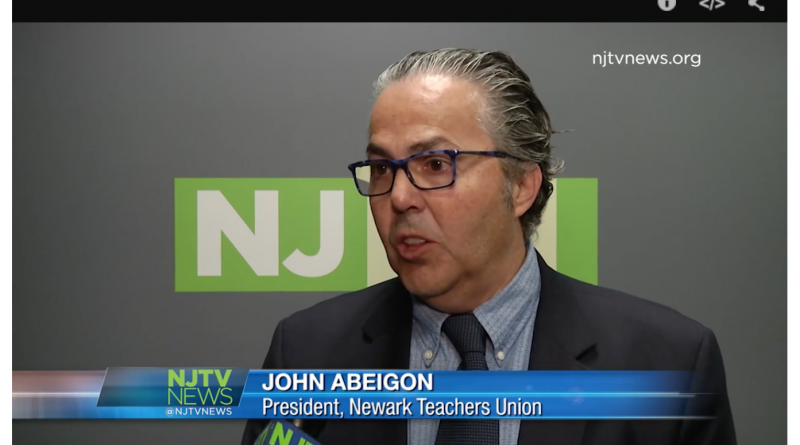Long Island Superintendents’ Jaw-Dropping Pension Payments:
February 29, 2016Is Education Reform Dead in New York State?
March 1, 2016Correcting the Record: NJEA President’s False Narrative of PARCC and Opt-Out Alliances
Last week Wendell Steinhauer, President of the New Jersey Education Association, published an editorial in the Asbury Park Press called “Parents, NJEA Winning Against PARCC.” You can guess the content from the title: tests aligned with N.J. state standards (once called the Common Core) are evil instruments designed to torture students and teachers.
Mr. Steinhauer has every right to his own opinions but, as they say, he doesn’t have the right to his own facts. So let’s not rewrite history in a slovenly attempt to derail a movement supported by every major civil rights organization in the country.
Here’s a few corrections to Steinhauer’s editorial.
Steinhauer writes, “It is never easy to challenge the status quo and we initially faced hostility as we sounded the alarm about PARCC.” But how can something be “the status quo” if it doesn’t exist yet? Remember, NJEA initiated its $15 million campaign against PARCC before the tests were first administered.
Steinhauer then asserts that parents (at least rich, white, suburban ones) linked arms with NJEA leadership to protest “high-stakes testing,” He’s talking about N.J.’s new tenure reform law that ties 10% of student outcomes to teacher evaluations. That law was implemented for the first time last year, after legislators reduced the original 30% to a minuscule 10%. In fact, PARCC is not “high-stakes” for teachers and the truth is in the outcomes: last year 97% of teachers received rankings of either “effective” or “highly-effective.
If PARCC isn’t “high stakes” for teachers, is it “high-stakes” for students? No, not at all. N.J. state statute requires a high school graduation qualifying test, but students are free to use other tests besides PARCC (SAT’s, ACT’s, Accuplacer) as well as portfolio assessments.
Steinhauer continues his fact-free commentary by claiming that hat one sign of the success of the NJEA/suburban parents alliance is the State Legislature’s response with new laws. One of these laws ensures that “our youngest and most vulnerable students will no longer have to worry about being subjected to unnecessary high-stakes testing.”
However, Steinhauer neglects to mention that “our youngest and most vulnerable students” never took standardized testing; ASK tests started in grade 3, just like PARCC. The legislation, which bars standardized testing in grades K-2, was a gratuitous pander to the anti-PARCC lobby. Certainly, it doesn’t change anything. It’s worth noting that the bill’s primary sponsor was Assemblywoman Mila Jasey, who also sponsors the NJEA-aligned charter school moratorium bill.
Then, pronounces Steinhauer, “ PARCC is not a good test.” Really? Compared to what? N.J.’s former “high school level” tests (HSPA’s) which former Education Commissioner Lucille Davy described as “really middle-school level”? Steinhauer says that PARCC is “too rigid” and that it forces teachers to “teach to the test.” I know that’s supposed to be a bad thing. But if a test evaluates critical thinking skills, then is it “teaching to the test” for a teacher to heighten student proficiency in critical thinking skills? And if so, why is that a bad thing?
(For more on this, see this response from the Collaborative for Student Success.)
Steinhauer lists two districts and one high school where “parents are speaking up, and their voices are being heard”: Montclair, Marlboro, and Indian Hills High School. All three draw students from wealthy suburbs. (Montclair is more diverse, but has a strong pro-union presence. Until late last week when a Superior Court judge ousted him, Sean Spiller, a top operative at NJEA, was on a special board that controlled district finances. Also, Montclair has a long history of racial inequity in its schools; its administration is admirably forthright about this critical issue. ) Indian Hills has an economically-disadvantaged enrollment of 1.2%. Marlboro has an economically-disadvantaged enrollment of 3.7%.
Something else: Marlboro is almost all white and Asian. Black and Hispanic students together comprise less than 5% of student enrollment. Indian Hills is 90% white, 4% Asian, 4.4% Hispanic, and 1% African-American.
Steinhauer’s catalogue of model N.J. school districts enlisted in his anti-PARCC army tells you something about the complexion of N.J.’s anti-accountability constituency.
He then writes that “we have the best public schools in the nation.” Sure, if you happen to live in Marlboro or attend Indian Hills. And he must know that this statement is demonstrably false.
Certainly, leadership of N.J.’s dominant teacher union demands top-level lobbying skills, and part of effective lobbying is creating a narrative that buttresses an organization’s goals. Yet shouldn’t the top spokesperson for a teachers’ union be respectful of facts? This sort of disingenuous account of N.J.’s struggle towards greater accountability and equity — goals that, certainly, the bulk of NJEA’s membership share — diminishes NJEA and Steinhauer’s credibility.
We need to tackle some profound issues with testing, teacher effectiveness, and universal access to course content for kids, whether or not they can afford to live in Marlboro or Indian Hills. Teachers and students deserve better than Steinhauer’s duplicitous narrative.





1 Comment
Are you paying more than $5 / pack of cigs? I buy my cigs over at Duty Free Depot and this saves me over 60% from cigarettes.